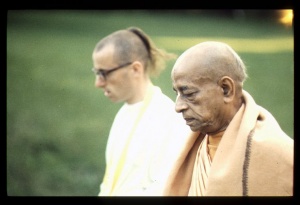SB 4.8.10: Difference between revisions
m (1 revision(s)) |
(Vanibot #0054 edit - transform synonyms into clickable links, which search similar occurrences) |
||
| (One intermediate revision by one other user not shown) | |||
| Line 1: | Line 1: | ||
{{info | {{info | ||
|speaker=Maitreya | |speaker=Maitreya Ṛṣi | ||
|listener=Vidura | |listener=Vidura | ||
}} | }} | ||
[[Category:Srimad-Bhagavatam - Canto 04 Chapter 08]] | |||
[[Category:Bhagavatam Verses Spoken by Maitreya Rsi - Vanisource|040810]] | |||
<div style="float:left">'''[[Srimad-Bhagavatam]] - [[SB 4|Fourth Canto]] - [[SB 4.8: Dhruva Maharaja Leaves Home for the Forest|Chapter 8: Dhruva Mahārāja Leaves Home for the Forest]]'''</div> | |||
<div style="float:right">[[File:Go-previous.png|link=SB 4.8.9]] '''[[SB 4.8.9]] - [[SB 4.8.11]]''' [[File:Go-next.png|link=SB 4.8.11]]</div> | |||
{{RandomImage}} | |||
==== TEXT 10 ==== | ==== TEXT 10 ==== | ||
<div | <div class="verse"> | ||
tathā cikīrṣamāṇaṁ taṁ | :tathā cikīrṣamāṇaṁ taṁ | ||
sapatnyās tanayaṁ dhruvam | :sapatnyās tanayaṁ dhruvam | ||
suruciḥ śṛṇvato rājñaḥ | :suruciḥ śṛṇvato rājñaḥ | ||
serṣyam āhātigarvitā | :serṣyam āhātigarvitā | ||
</div> | </div> | ||
| Line 16: | Line 22: | ||
==== SYNONYMS ==== | ==== SYNONYMS ==== | ||
<div | <div class="synonyms"> | ||
''[//vanipedia.org/wiki/Special:VaniSearch?s=tathā&tab=syno_o&ds=1 tathā]'' — thus; ''[//vanipedia.org/wiki/Special:VaniSearch?s=cikīrṣamāṇam&tab=syno_o&ds=1 cikīrṣamāṇam]'' — the child Dhruva, who was trying to get up; ''[//vanipedia.org/wiki/Special:VaniSearch?s=tam&tab=syno_o&ds=1 tam]'' — unto him; ''[//vanipedia.org/wiki/Special:VaniSearch?s=sa&tab=syno_o&ds=1 sa]-[//vanipedia.org/wiki/Special:VaniSearch?s=patnyāḥ&tab=syno_o&ds=1 patnyāḥ]'' — of her co-wife (Sunīti); ''[//vanipedia.org/wiki/Special:VaniSearch?s=tanayam&tab=syno_o&ds=1 tanayam]'' — son; ''[//vanipedia.org/wiki/Special:VaniSearch?s=dhruvam&tab=syno_o&ds=1 dhruvam]'' — Dhruva; ''[//vanipedia.org/wiki/Special:VaniSearch?s=suruciḥ&tab=syno_o&ds=1 suruciḥ]'' — Queen Suruci; ''[//vanipedia.org/wiki/Special:VaniSearch?s=śṛṇvataḥ&tab=syno_o&ds=1 śṛṇvataḥ]'' — while hearing; ''[//vanipedia.org/wiki/Special:VaniSearch?s=rājñaḥ&tab=syno_o&ds=1 rājñaḥ]'' — of the King; ''[//vanipedia.org/wiki/Special:VaniSearch?s=sa&tab=syno_o&ds=1 sa]-[//vanipedia.org/wiki/Special:VaniSearch?s=īrṣyam&tab=syno_o&ds=1 īrṣyam]'' — with envy; ''[//vanipedia.org/wiki/Special:VaniSearch?s=āha&tab=syno_o&ds=1 āha]'' — said; ''[//vanipedia.org/wiki/Special:VaniSearch?s=atigarvitā&tab=syno_o&ds=1 atigarvitā]'' — being too proud. | |||
</div> | </div> | ||
| Line 23: | Line 29: | ||
==== TRANSLATION ==== | ==== TRANSLATION ==== | ||
<div | <div class="translation"> | ||
While the child, Dhruva Mahārāja, was trying to get on the lap of his father, Suruci, his stepmother, became very envious of the child, and with great pride she began to speak so as to be heard by the King himself. | While the child, Dhruva Mahārāja, was trying to get on the lap of his father, Suruci, his stepmother, became very envious of the child, and with great pride she began to speak so as to be heard by the King himself. | ||
</div> | </div> | ||
| Line 30: | Line 36: | ||
==== PURPORT ==== | ==== PURPORT ==== | ||
<div | <div class="purport"> | ||
The King, of course, was equally affectionate toward both his sons, Uttama and Dhruva, so he had a natural inclination to take Dhruva, as well as Uttama, on his lap. But because of his favoritism towards his queen Suruci, he could not welcome Dhruva Mahārāja, despite his feelings. King Uttānapāda's feeling was understood by Suruci, and therefore with great pride she began to speak about the King's affection for her. This is the nature of woman. If a woman understands that her husband regards her as a favorite and is especially affectionate to her, she takes undue advantage. These symptoms are visible even in such an elevated society as the family of Svāyambhuva Manu. Therefore it is concluded that the feminine nature of woman is present everywhere. | The King, of course, was equally affectionate toward both his sons, Uttama and Dhruva, so he had a natural inclination to take Dhruva, as well as Uttama, on his lap. But because of his favoritism towards his queen Suruci, he could not welcome Dhruva Mahārāja, despite his feelings. King Uttānapāda's feeling was understood by Suruci, and therefore with great pride she began to speak about the King's affection for her. This is the nature of woman. If a woman understands that her husband regards her as a favorite and is especially affectionate to her, she takes undue advantage. These symptoms are visible even in such an elevated society as the family of Svāyambhuva Manu. Therefore it is concluded that the feminine nature of woman is present everywhere. | ||
</div> | </div> | ||
__NOTOC__ | |||
<div style="float:right; clear:both;">[[File:Go-previous.png|link=SB 4.8.9]] '''[[SB 4.8.9]] - [[SB 4.8.11]]''' [[File:Go-next.png|link=SB 4.8.11]]</div> | |||
__NOTOC__ | |||
__NOEDITSECTION__ | |||
Latest revision as of 21:57, 18 February 2024

A.C. Bhaktivedanta Swami Prabhupada
TEXT 10
- tathā cikīrṣamāṇaṁ taṁ
- sapatnyās tanayaṁ dhruvam
- suruciḥ śṛṇvato rājñaḥ
- serṣyam āhātigarvitā
SYNONYMS
tathā — thus; cikīrṣamāṇam — the child Dhruva, who was trying to get up; tam — unto him; sa-patnyāḥ — of her co-wife (Sunīti); tanayam — son; dhruvam — Dhruva; suruciḥ — Queen Suruci; śṛṇvataḥ — while hearing; rājñaḥ — of the King; sa-īrṣyam — with envy; āha — said; atigarvitā — being too proud.
TRANSLATION
While the child, Dhruva Mahārāja, was trying to get on the lap of his father, Suruci, his stepmother, became very envious of the child, and with great pride she began to speak so as to be heard by the King himself.
PURPORT
The King, of course, was equally affectionate toward both his sons, Uttama and Dhruva, so he had a natural inclination to take Dhruva, as well as Uttama, on his lap. But because of his favoritism towards his queen Suruci, he could not welcome Dhruva Mahārāja, despite his feelings. King Uttānapāda's feeling was understood by Suruci, and therefore with great pride she began to speak about the King's affection for her. This is the nature of woman. If a woman understands that her husband regards her as a favorite and is especially affectionate to her, she takes undue advantage. These symptoms are visible even in such an elevated society as the family of Svāyambhuva Manu. Therefore it is concluded that the feminine nature of woman is present everywhere.